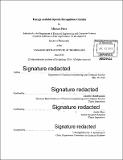Energy-scalable speech recognition circuits
Author(s)
Price, Michael, Ph. D. (Michael R.). Massachusetts Institute of Technology
DownloadFull printable version (26.64Mb)
Other Contributors
Massachusetts Institute of Technology. Department of Electrical Engineering and Computer Science.
Advisor
Anantha Chandrakasan and James Glass.
Terms of use
Metadata
Show full item recordAbstract
As people become more comfortable with speaking to machines, the applications of speech interfaces will diversify and include a wider range of devices, such as wearables, appliances, and robots. Automatic speech recognition (ASR) is a key component of these interfaces that is computationally intensive. This thesis shows how we designed special-purpose integrated circuits to bring local ASR capabilities to electronic devices with a small size and power footprint. This thesis adopts a holistic, system-driven approach to ASR hardware design. We identify external memory bandwidth as the main driver in system power consumption and select algorithms and architectures to minimize it. We evaluate three acoustic modeling approaches-Gaussian mixture models (GMMs), subspace GMMs (SGMMs), and deep neural networks (DNNs)-and identify tradeoffs between memory bandwidth and recognition accuracy. DNNs offer the best tradeoffs for our application; we describe a SIMD DNN architecture using parameter quantization and sparse weight matrices to save bandwidth. We also present a hidden Markov model (HMM) search architecture using a weighted finite-state transducer (WFST) representation. Enhancements to the search architecture, including WFST compression and caching, predictive beam width control, and a word lattice, reduce memory bandwidth to 10 MB/s or less, despite having just 414 kB of on-chip SRAM. The resulting system runs in real-time with accuracy comparable to a software recognizer using the same models. We provide infrastructure for deploying recognizers trained with open-source tools (Kaldi) on the hardware platform. We investigate voice activity detection (VAD) as a wake-up mechanism and conclude that an accurate and robust algorithm is necessary to minimize system power, even if it results in larger area and power for the VAD itself. We design fixed-point digital implementations of three VAD algorithms and explore their performance on two synthetic tasks with SNRs from -5 to 30 dB. The best algorithm uses modulation frequency features with an NN classifier, requiring just 8.9 kB of parameters. Throughout this work we emphasize energy scalability, or the ability to save energy when high accuracy or complex models are not required. Our architecture exploits scalability from many sources: model hyperparameters, runtime parameters such as beam width, and voltage/frequency scaling. We demonstrate these concepts with results from five ASR tasks, with vocabularies ranging from 11 words to 145,000 words.
Description
Thesis: Ph. D., Massachusetts Institute of Technology, Department of Electrical Engineering and Computer Science, 2016. Cataloged from PDF version of thesis. Includes bibliographical references (pages 135-141).
Date issued
2016Department
Massachusetts Institute of Technology. Department of Electrical Engineering and Computer SciencePublisher
Massachusetts Institute of Technology
Keywords
Electrical Engineering and Computer Science.